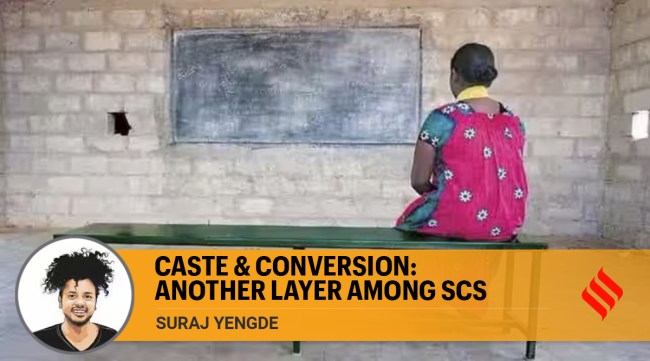Opinion Caste & conversion: another layer among the SCs
The Scheduled Caste community has to actively push for the recognition and emancipation of their Abrahamic counterparts who still lag behind the opportunities.
 By claiming the SC status, have the Abrahamic Dalits realised the mistake of their ancestors, that is, the commonality of Dalits across the faith is their subjugation? (Representative/ File)
By claiming the SC status, have the Abrahamic Dalits realised the mistake of their ancestors, that is, the commonality of Dalits across the faith is their subjugation? (Representative/ File) Section 2 of the Constitution (Scheduled Caste) Order of 1950 mentions the castes, races, or tribes that can be considered Scheduled Castes. The following paragraph 3 is devoted to identifying those who cannot be recognized. “No person who professes a religion different from Hinduism shall be deemed to be a member of a Scheduled Caste”. It was clear to the makers of the new nation who had to be excluded from the list.
Five decades later, the converted Muslim untouchables and some Christian Dalits went to court to rectify this and include them in the Scheduled Caste list. The reason given was that they were still being subjected to the lowly status despite conversion to a different faith.
Many Dalits in the coastal region happily gave in to the offers of the missionaries during colonial times. And the mainland untouchables bowed to the creator in mosques. They embraced their new religious identity. This newfound theology also offered them solace. Thus, began a new phase in the clothes of their new identity.
The origin story of the creation of the Scheduled Castes lay in the anthropological and census enquiry of the British administration. Following the Government of India Act, 1935, a Scheduled Castes Order was passed in 1936 stating that “Indian Christians” and “Bengali Buddhists or tribal religion” practitioners were excluded from the list of Scheduled Caste. The list and the meanings kept ameliorating slightly, but the castes identified in various states continued to date. The mention of Abrahamic faith was excluded because the raison d’etre of the religious category was already protected under the minority category, and they were touchables of the society.
During the drafting of this policy, it seems that Dalits Christians and Dalit Muslims did not advocate for their inclusion into the SC order. Even the dominant OBCs did not want to be identified with backwardness because it brought them into close proximity to Dalits. The same was with the now promoted, educated, and cultural-savvy Dalits. Many a time, due to educational and cultural advantages, Dalit Christians and Muslims have shunned their own Scheduled Caste Dalit brethren targeting them as inferior beings keeping no interpersonal or inter-religious relationships.
By claiming the SC status, have the Abrahamic Dalits realised the mistake of their ancestors, that is, the commonality of Dalits across the faith is their subjugation? The Abrahamic Dalits want to return to the identity of their forebears prior to the converted identity. The question remains, is it Hindu, Sikh, Buddhist, or Jain? However, their argument is not to relinquish their Abrahamic identity, but to claim the benefits that come with it.
An MP from Tamil Nadu told me adding them would demonstrate the numerical strength of the Scheduled Castes. However, if the facilities are distributed equally among the Scheduled Castes, there will be further divisions alongside rigid and unassuming identities that would overlook the interests of the castes as historical rather than contemporary.
In the redistribution of state resources meant for the Scheduled Castes, the generationally advantaged educational groups will have more to draw from. Offering Abrahamic Dalits with SC opportunities and adding them with special measures, as a separate quota is akin to being on the OBC list too, which is the case now.
The majority Muslim question in India is spiritually Sufi but electorally Mughal. The impetus of relying on the greatness of the Muslim rule bolstered through the texts and evidence of Islamic invasions in India adds to this dimension. The mass of the outcastes who converted to Islam gave up on their rich history and ancestors. While there, they were accepted into the ummah with promises of greater freedom and autonomy.
This sudden shift of assimilating into the Islam brotherhood divorced them from the cause of their struggle. Instead of fighting as converted Dalits against Brahminism, they took on Hindus as Muslims, not Dalits. However, there too, they remained subalterns of the hegemonic Islamic superiority. That is why the new demand for inclusion into the SC list gathers steam. The Scheduled Caste list is religion-neutral but untouchability is a doctrinal feature of the Hindu Brahminic society.
With the inclusion of Christians and Muslims into the SC list, will they contest elections as SCs or with their religious identities? As has been seen with the Sikh, Hindu, and Buddhist experiments, religious domination takes precedence over caste. Hitherto, Muslims or Christian groups have voted as a religious block than as SCs who have favoured a caste bank. Their voting patterns, educational portfolio, and employment opportunities will be starkly identified, creating animosity among SCs.
The Scheduled Caste community has to actively push for the recognition and emancipation of their Abrahamic counterparts who still lag behind the opportunities. A new constituency of SC Muslims or SC Christians will add another layer to the divisiveness of the SC category, which is already fraught with caste divisions.






